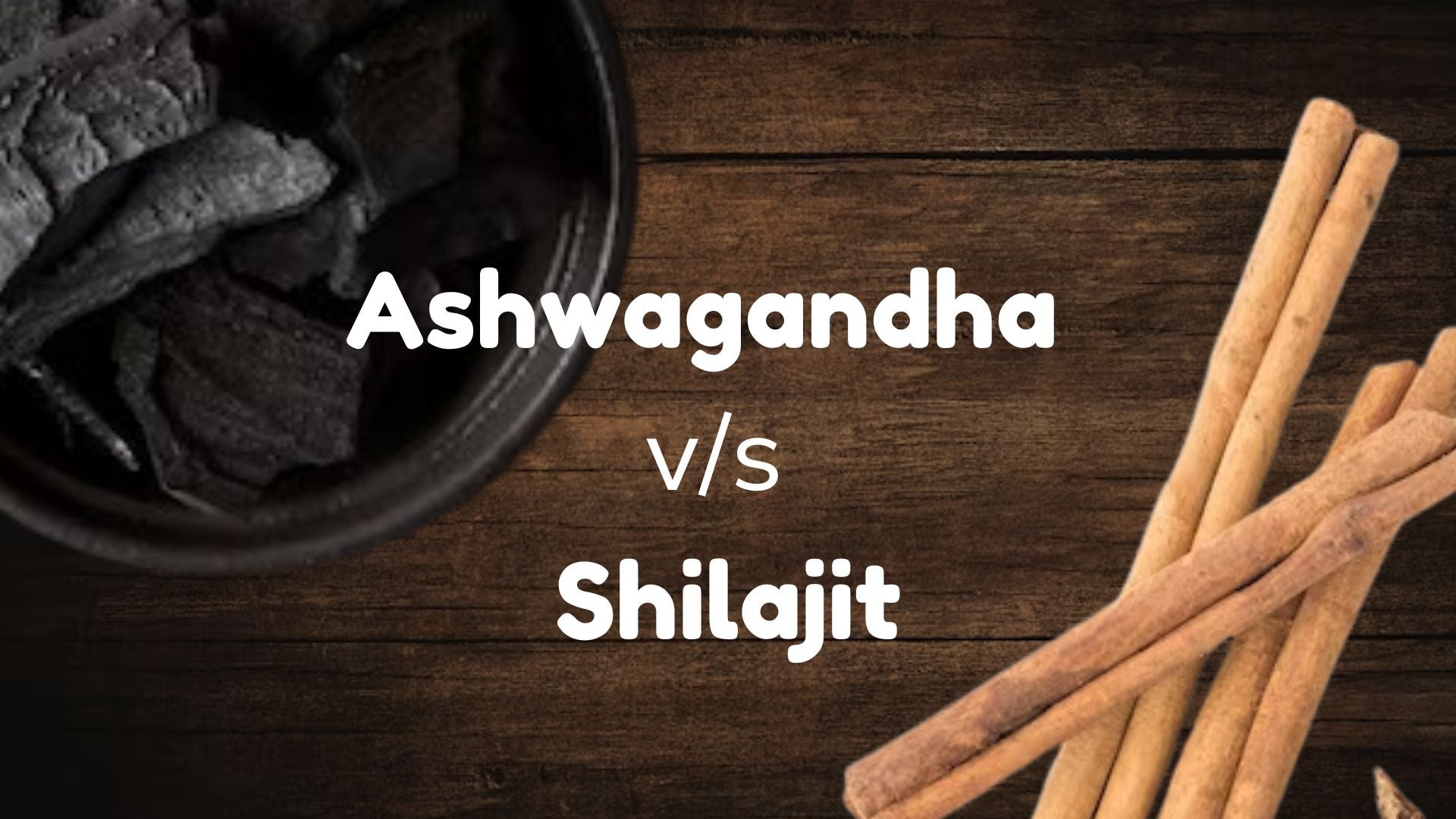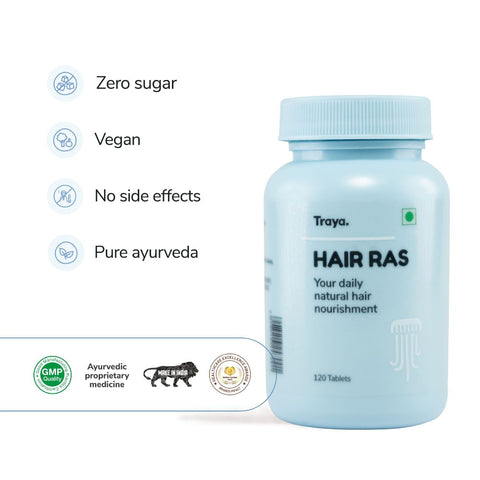अश्वगंधा पुरुषों के लिए एक बहुत उपयुक्त और गुणकारी जड़ी बूटी है। अश्वगंधा के फायदे आयुर्वेद में कई है जिसे हम ट्राया में उपयोग करते हैं। यह प्राकृतिक वृद्धि और ऊर्जा का स्रोत माना जाता है जो शारीरिक और मानसिक तनाव को कम करने में सहायक होता है। अश्वगंधा में पाये जाने वाले विशेष तत्व पुरुषों के प्रजनन स्वास्थ्य को समर्थित करते हैं और सेक्सुअल प्रदर्शन को बेहतर बनाने में मदद कर सकते हैं। इसके अलावा, अश्वगंधा पुरुषों के लिए अत्यधिक फायदेमंद हो सकता है। यह पुरुषों की ताकत, सहनशक्ति और प्रजनन क्षमता को सुधारने में मदद करता है। इसके अलावा, यह मानसिक तनाव को कम करने और प्रतिरक्षा प्रणाली को मजबूत करने में भी सहायक है। नियमित सेवन से यह शारीरिक और मानसिक स्वास्थ्य दोनों में सुधार ला सकता है।
अश्वगंधा क्या है?
अश्वगंधा, जिसे अजगंधा, अमंगुरा, अमुक्किराग भी कहा जाता है, एक प्राचीन औषधीय जड़ी-बूटी है जो अधिकतर भारत, अफ्रीका और मध्य पूर्व में पाई जाती है। सालों से लोग अश्वगंधा का उपयोग चिकित्सा के उद्देश्यों के लिए कर रहे हैं और इसके विभिन्न स्वास्थ्य लाभ हैं। अश्वगंधा शब्द इसकी जड़ की गंध या सार को दर्शाता है। यह एक प्राचीन जड़ी-बूटी है जो कैंसर, चिंता और अल्जाइमर जैसी विभिन्न बीमारियों से बचाने में मदद करती है।
मुफ़्त में अपने बालों का परीक्षण करें ⬇️
अश्वगंधा के फायदे हिंदी
अश्वगंधा एक संस्कृत शब्द है, जहां "अश्व" घोड़े को और "गंध" खुशबू को दर्शाता है। माना जाता है कि इस जड़ का उपयोग करने से आप घोड़े की ताकत प्राप्त करते हैं। अश्वगंधा की जड़ से उत्पन्न पाउडर ऊर्जा को बढ़ाता है, तनाव को कम करता है और पुरुषों के लिए कई अलग-अलग तरीकों से फायदेमंद होता है।
१. चिंता और तनाव को कम करना
अनुचित तनाव और तनाव विकारों "चुपचाप मारने वाले" परेशानियाँ है, जो सेहत से जुड़ी विभिन्न समस्याओं का कारण बन सकते हैं, जो आपके प्रतिरक्षा प्रणाली को भी नुकसान पहुंचा सकते हैं, मस्तिष्क पर असर डाल सकते हैं और आपके जीवाश्म तंत्र के प्राकृतिक काम को भी अस्तव्यस्त कर सकते हैं। अश्वगंधा महिलाओं और पुरुषों के लिए अध्ययनों में इसके तनाव स्तर को कम करने के सबूत हैं। ट्राया के हेयर रस जैसे उत्पाद में अश्वगंधा है जो तनाव और नींद के दो मुख्य कारणों पर ध्यान केंद्रित करता है, जो बालों का झड़ना का प्रमुख कारण हो सकते हैं।
२. नींद की चक्रवात
तनाव आपके शरीर से गुजरता है तो कॉर्टिसोल स्तर बढ़ सकता है और आपकी नींद की गुणवत्ता बिगड़ सकती है। अश्वगंधा पुरुषों के लिए नींद लाने में बहुत फायदेमंद है, क्योंकि इस जड़ी-बूटी में ट्रिमेथिलीन ग्लाइकॉल होता है जो लंबे समय तक नींद की बीमारियों का उपचार कर सकता है जिसमें इन्सोम्निया भी शामिल है।
३. मांसपेशियों की ताकत और विकास को बढ़ावा देना
अश्वगंधा में मांसपेशियों की मात्रा को बढ़ाने, शरीर की चर्बी कम करने और पुरुषोंमें ताकत बढ़ाने के साथ-साथ मदद करने के दस्तावेजों हैं। अध्ययनों के अनुसार, इस जड़ी-बूटी का सेवन ताकत और मांसपेशियों की मात्रा में एक महत्वपूर्ण वृद्धि लाता है और उनके शरीर की चर्बी की मात्रा को कम करता है। एक अन्य अध्ययन में पाया गया कि उन पुरुषों को जिन्होंने एक ग्राम इस जड़ी-बूटी का सेवन प्रतिदिन किया, सिर्फ 30 दिनों में काफी मांसपेशियों की ताकत में वृद्धि हुई।
४. मस्तिष्क कार्य और स्मृति में मदद
अश्वगंधा पुरुषों के लिए आपकी स्मृति को बढ़ा सकती है और एंटीऑक्सिडेंट गतिविधि को प्रोत्साहित करती है जो हानिकारक मुक्त रेडिकल से न्यूरॉन कोशिकाओं को बचाती है। अध्ययन भी सुझाव देते हैं कि यह मस्तिष्क शक्ति के अन्य पहलुओं को बढ़ाने की शक्ति रखता है। जड़ की 300 मिलीग्राम दो बार प्रतिदिन लेने से स्मृति स्वास्थ्य, कार्य दक्षता और कार्य प्रदर्शन में महत्वपूर्ण सुधार हो सकता है।
५. शोथ को कम करता है और प्रतिरक्षा बढ़ाता है
अश्वगंधा में शक्तिशाली एंटीऑक्सीडेंट होते हैं जो मुक्त रेडिकल्स के कारण हुए नुकसान को ठीक कर सकते हैं। इस जड़ी बूटी को प्रतिदिन सिर्फ 10 मिलीलीटर लेने से संक्रमण से लड़ने वाले प्रतिरक्षा कोशिकाओं के स्तर में वृद्धि होती है। हाल ही में पोर्टलैंड में आयोजित एक अध्ययन में यह जड़ी बूटी शोथ को कम करने में भी मददगार साबित हुई है।
यह भी पढ़े: अश्वगंधा के फायदे महिलाओं के लिए
पुरुषों के यौन स्वास्थ्य के लिए अश्वगंधा के फायदे
६. शुक्राणु को ताकतवर बनाता है
अश्वगंधा पुरुषों की यौन क्षमता और इच्छाशक्ति बढ़ाने के लिए पारंपरिक रूप से उपयोग किया जाता है। इस जड़ी बूटी का प्रयोग विभिन्न अध्ययनों में फर्टिलिटी बढ़ाने वाली गुणों को बढ़ाने के लिए भी किया जाता है। इसे प्रतिदिन 5 ग्राम लेने से शुक्राणु संख्या और गति बढ़ जाती है और T-लेवल में भी विशेष बढ़ोत्तरी देखी जाती है।
७. उच्चतर टेस्टोस्टेरोन
अश्वगंधा बूटी टेस्टोस्टेरोन के स्तर को काफी बढ़ाती है। पुरुषों में उम्र बढ़ने के साथ-साथ इस हार्मोन की उत्पादन भी उनके शरीर में काफी कम हो जाती है। इसके अलावा, कहा जाता है कि इस हार्मोन का स्तर प्रति वर्ष 30 साल की उम्र पर पुरुषों में 0.4 से 2 प्रतिशत तक गिरना शुरू हो जाता है। पुरुषों को बालों का झडना, मांसपेशियों का नुकसान का सामना करना पड़ सकता है। अश्वगंधा टेस्टोस्टेरोन उत्पादन में मदद करता है और टेस्टोस्टेरोन और लुटिनाइजिंग हार्मोन के सीरम स्तर में वृद्धि करता है। अश्वगंधा पुरुषों में सेक्सुअल हार्मोनों के प्राकृतिक संतुलन को पुनर्स्थापित कर सकती है।
८. यौन सुख में वृद्धि
अश्वगंधा विशेष रूप से यौन स्वास्थ्य को बेहतर बनाने के लिए जानी जाती है। यह जड़ी-बूटी नसों को शांत करने का काम भी करती है, जिससे यौन समय के दौरान आराम महसूस होता है और प्रदर्शन चिंता कम होती है। अश्वगंधा शारीरिक ऊर्जा और स्टैमिना को बढ़ाने में भी सहायक है, जिससे लंबे समय तक यौन क्रिया में सक्षमता आती है।
९. सहायता इरेक्टाइल डिसफंक्शन में
अश्वगंधा तनाव और चिंता का प्रबंधन करने में मदद कर सकता है, जो कि इरेक्टाइल डिसफंक्शन के प्रमुख कारणों में से एक हो सकते हैं। इरेक्टाइल डिसफंक्शन (ED) पुरुषों में एक ऐसी स्थिति है जिसमें वे लिंग की पर्याप्त दृढ़ता नहीं बना पाते हैं या उसे बनाए नहीं रख पाते हैं जो यौन संभोग के लिए आवश्यक होती है। इसके विभिन्न कारण हो सकते हैं, जिसमें मनोवैज्ञानिक कारण जैसे तनाव और चिंता मुख्य होते हैं। अश्वगंधा को आयुर्वेद में 'वाजीकरण' हर्ब्स में गिना जाता है जो यौन स्वास्थ्य और उर्जा को बढ़ाते हैं। : यह जड़ी-बूटी टेस्टोस्टेरोन जैसे पुरुष सेक्स हार्मोन के उत्पादन को संतुलित करने में सहायक हो सकती है, जो कि ED में सुधार ला सकती है।
१०. बिस्तर पर सहनशीलता में सुधार
अश्वगंधा सेवन से यौन क्रियाकलाप के दौरान स्टैमिना में सुधार हो सकता है। इस जड़ी बूटी में उर्जा बढ़ाने के गुण होते हैं, जो न केवल शारीरिक बल्कि मानसिक स्थिति को भी बेहतर बनाते हैं। यौन उत्तेजना और कामेच्छा में वृद्धि से यह स्टैमिना और सहनशीलता में सहायता करता है, जिससे बिस्तर पर लंबे समय तक बने रहने की क्षमता में वृद्धि होती है।
मुफ़्त में अपने बालों का परीक्षण करें ⬇️
११. पुरुषों में फर्टिलिटी में वृद्धि
कुछ अध्ययनों से पता चलता है कि अश्वगंधा पुरुषों में शुक्राणुओं की संख्या और फर्टिलिटी को बढ़ा सकता है। यह जड़ी बूटी शरीर में हार्मोनल संतुलन को बेहतर बनाती है, जिससे टेस्टोस्टेरोन स्तर में सुधार होता है। बढ़ा हुआ टेस्टोस्टेरोन स्तर शुक्राणु उत्पादन को प्रोत्साहित कर सकता है, जिससे फर्टिलिटी में वृद्धि होती है।
१२ . शुक्राणु गतिशीलता में वृद्धि
अश्वगंधा से शुक्राणु की सक्रिय गति में सुधार हो सकता है, जो कि फर्टिलिटी के लिए अत्यंत महत्वपूर्ण है। गतिशील शुक्राणु अधिक सक्षम होते हैं अंडाणु तक पहुँचने और निषेचन की प्रक्रिया को पूरा करने में। अश्वगंधा के एंटीऑक्सीडेंट गुण शुक्राणु कोशिकाओं की सुरक्षा करते हैं और उनकी गतिशीलता और जीवित रहने की क्षमता में वृद्धि होती है।
अश्वगंधा के फायदे बालों के लिए

बाल फोलिकल में उच्च स्तर के तनाव हार्मोन का प्रभाव बालों के विकास चक्र पर पड़ता है, और बालों के झड़ने का संबंध उच्च स्तर के तनाव हार्मोन, जिसे कॉर्टिसोल भी कहा जाता है। हालांकि हम सभी जानते हैं कि तनाव को अपने जीवन में संभालना कितना महत्वपूर्ण है ताकि हम स्वस्थ और खुश रह सकें, इसमें अश्वगंधा का सहायक होता है। यह न केवल चिंता और तनाव को कम करता है, बल्कि बालों के लिए भी कई फायदे प्रदान करता है। नीचे हमने कुछ शानदार अश्वगंधा के फायदे बालों के लिए सूचीबद्ध किए हैं -
1. बालों के झड़ने से राहत देता है
कॉर्टिसोल या तनाव स्तर में वृद्धि बाल फोलिकल के सही कामकाज पर असर डालती है, जिससे बालों का झड़ना होता है। अश्वगंधा बालों के झड़ने को रोकने में मदद करता है और शरीर के तनाव स्तर को नियंत्रित करने में उपयोगी हो सकता है।
2. स्कैल्प इरिटेशन को नियंत्रित करता है
अश्वगंधा में एंटी-इंफ्लेमेट्री प्रॉपर्टीज़ होती हैं, जो आपके बालों के फोलिकल की सामान्य सेहत को सुधारने में मदद करती हैं। यह इन्फ्लेमेशन से होने वाली अन्य स्कैल्प समस्याओं जैसे खुजली, एक्जिमा, रूसी और अन्य एलर्जी को रोकता है।
3. बालों को मजबूत बनाता है
अश्वगंधा में एंटीऑक्सिडेंट्स और एमिनो एसिड्स होते हैं जो स्वस्थ बालों के लिए योगदान कर सकते हैं। अश्वगंधा दिहाइड्रोएपिएंड्रोस्टेरोन (डीएचईए) के उत्पादन को उत्तेजित करता है - यह शरीर में एक प्राकृतिक हार्मोन है जो एक अंतिम एंटीऑक्सिडेंट है। अश्वगंधा बालों और फोलिकल से फ्री रेडिकल्स का सामना करने में मदद करता है, जो स्वस्थ बालों के विकास को प्रोत्साहित करता है।
4. बालों और स्कैल्प की देखभाल
आपके बालों के झिल्ली पर प्राकृतिक सेबम होता है। अश्वगंधा के उत्पादन के कारण हुए डीएचईए की प्रेरणा से, आपके स्कैल्प पर कॉलेजन और सेबम का उत्पादन बढ़ता है। इससे आपके स्कैल्प को मेहनतशील रखने में मदद मिलती है, साथ ही आपके सूखे और ब्रिटल बालों को मरम्मत करता है। बालों में सेबम और कॉलेजन से आपके स्कैल्प और बालों को सूर्य के नुकसान से बचाया जाता है।
5. शीघ्र सफेद बालों को बदलता है
अश्वगंधा बालों के लिए टायरोसीन नामक एक अमिनो एसिड होता है जो आपके बालों के फोलिकल में मेलेनिन उत्पादन को प्रोत्साहित करने में मदद करता है। यह खोया हुआ मेलेनिन को समर्थन करेगा और शीघ्र सफेद हो रहे बालों को पलट सकता है। ट्राया के हेयर रस जैसे उत्पाद में अश्वगंधा है जो तनाव और नींद को काम करता है।
6. बालों का पोषण करता है
अश्वगंधा बालों के लिए प्रोटीन, आयरन, विटामिन सी, ग्लूकोज, टैनिन, पोटैशियम और नाइट्रेट से भरपूर फ्लेवोनॉइड्स होता है। ये महत्वपूर्ण घटक स्वस्थ बालों के विकास के लिए महत्वपूर्ण होते हैं। अश्वगंधा आपके स्कैल्प में रक्त संचरण को सुधारता है, जो आपके बालों के फोलिकल्स को पोषित करने में भी मदद करता है।
अश्वगंधा चूर्ण के फायदे

अश्वगंधा एक जड़ी बूटी है जो एक प्राकृतिक औषधि के रूप में प्रयुक्त होती है। यह भारतीय आयुर्वेद में इस्तेमाल की जाती है। अश्वगंधा चूर्ण कई स्वास्थ्य समस्याओं के इलाज में मददगार होता है। इसके कुछ मुख्य फायदे इस प्रकार हैं:
1. फोकस और मेमोरी में वृद्धि
अश्वगंधा चूर्ण का सेवन बल संबंधी विशेषताओं से भरपूर होता है, जो आपके मस्तिष्क को ताकत देते हैं। इसके सेवन से आपका मेमोरी और फोकस बेहतर हो सकते हैं।
2. ब्लड शुगर और फैट में कमी
अश्वगंधा चूर्ण में अनेक औषधीय गुण होते हैं जो ब्लड शुगर और फैट को कम करने में मदद करते हैं। इसके सेवन से आपका वजन कम हो सकता है और आपके शरीर के लिए कार्यक्षमता बढ़ सकती है।
3. तनाव और चिंता मिटाएं
अश्वगंधा चूर्ण तनाव और चिंता को कम करने में मदद करता है। इसके सेवन से आपकी मानसिक स्थिति बेहतर हो सकती है और आपको अधिक शांति मिल सकती है। ट्राया के हेयर रस जैसे उत्पाद में अश्वगंधा है जो
4. हृदय स्वास्थ्य का समर्थन
अश्वगंधा चूर्ण आपके हृदय स्वास्थ्य को समर्थन करता है। इसके सेवन से आपके हृदय की कार्यक्षमता बढ़ सकती है और आपके हृदय के लिए अधिक स्वस्थ खाने की तरफ ध्यान देने के लिए प्रेरित कर सकता है।
5. मांसपेशियों और ताकत का बढ़ना
अश्वगंधाचूर्ण में मौजूद विशेष गुण मांसपेशियों को बलवान बनाने में मदद करते हैं। इसके सेवन से आपकी शारीरिक ताकत बढ़ सकती है और आपको अधिक ऊर्जा मिल सकती है।
यह भी पढ़ें: शतावरी के फायदे महिलाओं के लिए
अश्वगंधा का सेवन कैसे करें
अश्वगंधा के बालों, त्वचा और सामान्य स्वास्थ्य के लाभ बेहद आकर्षक होते हैं और किसी को भी इसका उपयोग करने के लिए प्रेरित करते हैं। चाहे आप अश्वगंधा के पत्ते का उपयोग करें या उसकी डंठल; इस गूची के हर अंग का आपके स्वास्थ्य के लिए लाभदायक होता है। लेकिन इसका सही तरीके से उपयोग आपको अधिक लाभ प्रदान करेगा। नीचे हमने बालों के झड़ने के लिए अश्वगंधा का उपयोग करने के विभिन्न तरीके साझा किए हैं –
1. अश्वगंधा सप्लीमेंट
अश्वगंधा पाउडर का रासायनिक रूप से परंपरागत उपयोग किया जाता है, और आज भी इसके लाभ के लिए इस्तेमाल होता है। अश्वगंधा सप्लीमेंट उपयोग करना आसान होता है और इसे आसानी से उपलब्ध किया जा सकता है। कई बाल वृद्धि सप्लीमेंट्स में अश्वगंधा होता है, और ये तेल के रूप में आपके साथियों के साथ लेने चाहिए, जिसमें गुणवत्ता वाले चिकने तेल हों। बालों के झड़ने के लिए अश्वगंधा की खुराक 300-500 मिलीग्राम प्रतिदिन होनी चाहिए।
2. अश्वगंधा चूर्ण
अश्वगंधा चूर्ण या पाउडर इस औषधीय गूची के लाभ को प्राप्त करने का एक पारंपरिक रूप है। आप रोजाना अपने नाश्ते के बाद एक चम्मच अश्वगंधा चूर्ण ले सकते हैं। आप इसे गरम दूध, शहद या घी के साथ ले सकते हैं। क्योंकि यह चिकित्सा शक्तिशाली होती है, इसे ¼ चम्मच के साथ लेना सुझावित किया जाता है, और फिर बढ़ते समय आप मात्रा को बढ़ा सकते हैं। आप इसे दूध के साथ सेवन कर सकते हैं। सूखी, कटी हुई और छानी हुई पाउडर को दूध के साथ मिलाकर आपने पसंद के मिठाईकरण के साथ रात को सेवन करें। आप इन चूर्ण गोलियों को बना सकते हैं, जिनमें सफेद मूसली, अश्वगंधा, शिलाजीत जैसी जड़ी बूटियाँ होती हैं जो यौन नपुंसकता के लाभ को कम करने में मदद कर सकती हैं।
3. अश्वगंधा चाय
हर्बल चाय अपने फायदे रखता है, और जब आप अपने चाय कप में अश्वगंधा को शामिल करते हैं, तो इससे अधिक बेहतर कुछ नहीं होता। एक चम्मच अश्वगंधा पाउडर या कुछ सूखी अश्वगंधा जड़ें डालें और इसे ढककर ढीमी आंच पर दस से पन्द्रह मिनट तक उबालें। फिर चाय को एक कप में छानकर उसमें थोड़ा शहद और नींबू मिलाएं। आपकी अश्वगंधा चाय तैयार है।
4. ट्राया हेयर रस टैबलेट्स
हेयर रस बालों के लिए सुपरहीरो मिश्रण है। यह शरीर के दोषों को संतुलित करता है और बालों के झड़ने और नुकसान को कम करने में चमत्कारिक रूप से काम करता है। इसमें भृंगराज, अश्वगंधा, आंवला, अर्जुन, ताप्यदि लौह और शतावरी जैसी शक्तिशाली जड़ी बूटियाँ होती हैं, जो आपके बालों और शरीर के लिए सुरक्षा करने में मदद करती हैं।
5. अश्वगंधा टेबलेट, कैप्सूल के फायदे
यह जड़ी बूटी लेने का सबसे तेज़ और सरल तरीका है। कई विभिन्न कंपनियों के ब्रांडों में यह टैबलेट्स कैप्सूल रूप में उपलब्ध होते हैं, जो पुरुषों को इसे कम से कम दो बार प्रतिदिन लेने से उनके समग्र कल्याण में सहायता कर सकते हैं।
6. पानी के साथ अश्वगंधा
अगर आप एक शाकाहारी हैं, तो यह इस जड़ी बूटी को लेने का सबसे तेज़ तरीका है। इसकी तैयारी दूध के साथ जैसी ही होती है, लेकिन इसमें दूध की जगह पानी डाला जाता है। आप इस मिश्रण को सेवन कर सकते हैं।
आश्वगंधा के पुरुषों के लिए दुष्प्रभाव
जब आप इस जड़ी बूटी का सेवन करते हैं, तो इसे सही तरीके से लेना महत्वपूर्ण है। इसका मतलब है, स्वास्थ्य स्थिति के आधार पर उचित मात्रा का चयन करना, रात को लेना या सुबह को लेना। दुष्प्रभावों से बचने के लिए, यह महत्वपूर्ण है कि आप इसे दैनिक रूप से कैसे और कितनी मात्रा में लें, और फॉर्म और मात्रा के साथ निरंतर रहें।
- रक्तचाप पर दुष्प्रभाव: जब रक्तचाप विशेष रूप से कम होता है, तो जड़ी बूटी के उपयोग से आपके रक्तचाप पर दुष्प्रभाव हो सकते हैं।
- पेट दर्द और उल्टी की समस्या: जब इस जड़ी बूटी की अधिक मात्रा ली जाती है, तो दस्त, पेट दर्द और उल्टी की समस्या हो सकती है।
- त्वचा एलर्जी: अश्वगंधा का सेवन करने से त्वचा एलर्जी का संभावना होती है।
- श्वसन संकट: कुछ मामलों में, अश्वगंधा का सेवन श्वसन संकट को बढ़ा सकता है।
- पेट खराबी: अश्वगंधा का सेवन करने से पेट में अस्वस्थता की संभावना होती है।
- बहुत अधिक मात्रा में जड़ी बूटी का उपयोग करने से आपकी किडनी और थायरॉयड ग्रंथियों के कार्य पर क्षति पहुंच सकती है।
किसी भी पूरक या दवा के सेवन से पहले एक चिकित्सक से परामर्श करें।
शिलाजीत और अश्वगंधा (Shilajit and Ashwagandha)

यह भी पढ़ें: पुरुषों के लिए शिलाजीत के 17 गजब फायदे
विशेषता |
अश्वगंधा |
शिलाजीत |
|
मूल्यांकन |
एडेप्टोजेन |
पुनर्जीवन और प्राकृतिक ऊर्जा |
|
मूल |
भारतीय उपमहाद्वीप में पाया जाने वाला जड़ी बूटी |
हिमालय के पर्वतमालाओं में पाया जाने वाला खनिज-युक्त पदार्थ |
|
स्वास्थ्य लाभ |
तनाव प्रतिक्रिया में सहायता, ऊर्जा स्तर बढ़ाने, प्रतिरक्षा प्रणाली को सुधारने, शारीरिक और मानसिक स्वास्थ्य के लिए उपयोगी |
ऊर्जा, स्थायित्व, पुरुषों के प्रजनन स्वास्थ्य को समर्थन करने, उम्र बढ़ाने के प्रभाव, व्यायाम के बाद की सेहत के लिए उपयोगी |
|
सेवन का तरीका |
कैप्सूल, पाउडर, तेल, अवधि |
रेजिन, पाउडर, पानी, दूध, अवधि |
|
दुष्प्रभाव और सावधानियां |
उचित मात्रा में लेने पर सुरक्षित, कुछ लोगों में हल्का पेट दर्द, दस्त, नींद आना या थकान महसूस हो सकती है |
मात्रा को मोड़े में लेने पर सुरक्षित, विश्वसनीय और प्रमाणित आपूर्तियों के स्रोतों का चयन करना अत्यंत महत्वपूर्ण |
|
व्यक्तिगत उपयोग |
व्यक्ति के स्वास्थ्य लक्ष्य और आवश्यकताओं के आधार पर एकल या साथ में इस्तेमाल किया जा सकता है |
व्यक्ति के स्वास्थ्य लक्ष्य और आवश्यकताओं के आधार पर एकल या साथ में इस्तेमाल किया जा सकता है |
पूछे जाने वाले प्रश्न: (Frequently Asked Questions)
1. पुरुषों के लिए अश्वगंधा का उपयोग कैसे करें?
पुरुषों के लिए अश्वगंधा का उपयोग स्ट्रेस से निपटने, शक्ति बढ़ाने, शीघ्रपतन से निपटने, शुक्राणु की मात्रा को बढ़ाने, और वजन बढ़ाने में मदद कर सकता है। ट्राया के हेयर रस जैसे उत्पाद में अश्वगंधा है।
2. अश्वगंधा का असर कितने दिन में होता है?
अश्वगंधा के असर को देखते हुए 1 से 2 हफ्तों के दौरान महसूस किया जा सकता है।
3. अश्वगंधा पुरुषों में क्या करती है?
अश्वगंधा पुरुषों में शक्ति, ऊर्जा, विटामिन डी का स्तर बढ़ाने, मानसिक स्थिति को सुधारने, शुक्राणु की मात्रा को बढ़ाने, और शीघ्रपतन से निपटने में मदद कर सकता है।
4. अश्वगंधा किस लिए खड़ा है?
अश्वगंधा शक्ति बढ़ाने, स्ट्रेस से निपटने, शुक्राणु की मात्रा को बढ़ाने, शीघ्रपतन से निपटने, और वजन बढ़ाने में मदद कर सकता है।
5. पुरुषों के लिए कौन सा अश्वगंधा सबसे अच्छा है?
पुरुषों के लिए कई प्रकार के अश्वगंधा उपलब्ध हैं लेकिन कुछ सबसे अधिक लोकप्रिय हैं जैसे कि कूटकी, चूर्ण, और कैप्सूल। ट्राया के हेयर रस जैसे उत्पाद में अश्वगंधा है जो तनाव और नींद को काम करता है।
6. अश्वगंधा रोज लेने से क्या होता है?
अश्वगंधा रोज लेने से शक्ति में इजाफा होता है, मानसिक स्थिति सुधारती है, और शुक्राणु की मात्रा बढ़ती है।
7. क्या मैं अश्वगंधा की गोली रोज ले सकता हूं?
हाँ, अश्वगंधा की गोली रोज ली जा सकती है, लेकिन इससे पहले एक डॉक्टर से सलाह लेनी चाहिए। ट्राया के हेयर रस जैसे उत्पाद में अश्वगंधा है जो तनाव और नींद को काम करता है। ट्राया के हेयर रस प्रतिदिन नाश्ते के बाद 2 गोलियाँ लें, और रात के खाने के बाद 2 गोलियाँ लें।
8. अश्वगंधा लेने का सबसे अच्छा समय कौन सा है?
अश्वगंधा लेने का सबसे अच्छा समय सुबह खाली पेट या रात को सोने से कुछ समय पहले है। ट्राया के हेयर रस प्रतिदिन नाश्ते के बाद 2 गोलियाँ लें, और रात के खाने के बाद 2 गोलियाँ लें।
REFERENCES:
Adrian L. Lopresti, Peter D. Drummond and Stephen J. Smith- March 2019
A Randomized, Double-Blind, Placebo-Controlled, Crossover Study Examining the Hormonal and Vitality Effects of Ashwagandha (Withania somnifera) in Aging, Overweight Males
https://www.ncbi.nlm.nih.gov/pmc/articles/PMC6438434/
K Chandrasekhar, Jyoti Kapoor, Sridhar Anishetty | July 2012
A prospective, randomized double-blind, placebo-controlled study of safety and efficacy of a high-concentration full-spectrum extract of ashwagandha root in reducing stress and anxiety in adults
https://pubmed.ncbi.nlm.nih.gov/23439798/
Ganpat Devpura, Balvir S. Tomar, Deepak Nathiya, Abhishek Sharma, Deepak Bhandari,d Swati Haldar, Acharya Balkrishna, Anurag Varshneye | April 2021
Randomized placebo-controlled pilot clinical trial on the efficacy of ayurvedic treatment regime on COVID-19 positive patients
https://www.ncbi.nlm.nih.gov/pmc/articles/PMC7857981/








































